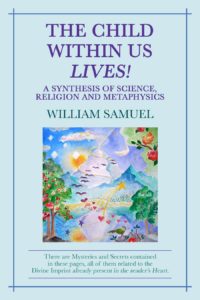 Here is the longer version of the “Seeing Good” story:
Here is the longer version of the “Seeing Good” story:
MORE PERTAINING TO SEEING GOOD
A JOURNAL ENTRY
Words came in my sleep this morning. If they can be recalled, it would be a wonderful gift to my world. I still hear the gist of them and their significance.
It has to do with “right doing” and what righteousness means. It has to do with Godly action and deed. It has to do with those of us who want to do as we are supposed to do.
Oh, the words come back slowly and sluggishly. I heard a rhythm of sounds saying that we look for God/good in others and this is godly action. Looking for truth in books is good, but looking for truth in mankind is better. Looking for wisdom within ourselves is good, but seeing it in mankind is better. To search for truth in disciplines is good, but to look for it and see it in mankind is the true discipline and the reason for our sojourn on earth. God’s good is reflected in the good of mankind and that good is here to be sought and seen. Man is, after all, made originally in the image and likeness of God.
The gist is so simple, really. My listening ears want to hear the music of the spheres and voices of thunder, so the simple sounds of Truth are ignored. But the secret lies in looking for good. Just that. We look for good in everything and this is good action. And there is higher action yet—to look for good in humanity, quantum man. Mankind is the child of God.
RIGHTEOUSNESS AND GODLINESS
Godlikeness is seeing GOOD. This is precisely what George Washington Carver did while he held the lowly peanut in his hand. He looked at the “thing,” examined it carefully and asked God to show him uses for it beyond the ordinary. Within a few years he had a hundred good uses for that inordinately simple legume that grows in the sandy soil of south. There is more good in the peanut than meets the eye.
We look for the good in everything. It is present to be seen and utilized. But, especially, we look for good in our fellow man. The good we see there is the good we are here. Why? We can’t see it unless we be it. We recognize the good we are. We are it first, then we see it in others. We were made in the image and likeness of God—all good. “And God saw everything he had made and, behold, it was very good.
When I was in China, I accepted a discipline to do. I went to the village, sat on the corner by the town well, and looked for something good in each person that went to the well for water. It was easy enough to do when a pretty lady came to the well. It wasn’t so easy when a dirty, ragged, bound-footed creature struggled to draw water. But I was instructed not to stop until I could see something good there.
There is something good, for goodness sake, in everyone. Everyone has a redeeming value hidden somewhere. Somehow, that practice of looking for good in people became a habit. That was my old teacher’s hope, I’m sure. In the forty-five years since, I have never failed to see it if I looked hard enough. Like Mr. Carver’s examination of the peanut.
Since people are made in the image and likeness of God, to see good in them is to see God in them. To see God in everything is very nearly the reason we’re present in/as this experience.
And more: There is something mysterious in this simple practice. A great power begins to accumulate around us as we do this. The person we are seeing is helped by that observation as surely as if we had taken him in our arms and washed him clean of trial and anguish. And in the process we are blessed with a strange and wonderful—I don’t know what to call it—power or authority or effluvium or charisma. Whatever it is, it is something very special. It is something mysterious. One does not have to work long at this to find it so—and most wonderful for the doing. But hear this: it takes the doing. Not the talking about it and speculating about it—analyzing and judging it. The doing. We look for the good in everyone and are blessed by the looking—even as our world is blessed by the same action.
Excerpt from “The Child Within Us Lives! A Synthesis of Science, Religion and Metaphysics”
By William Samuel